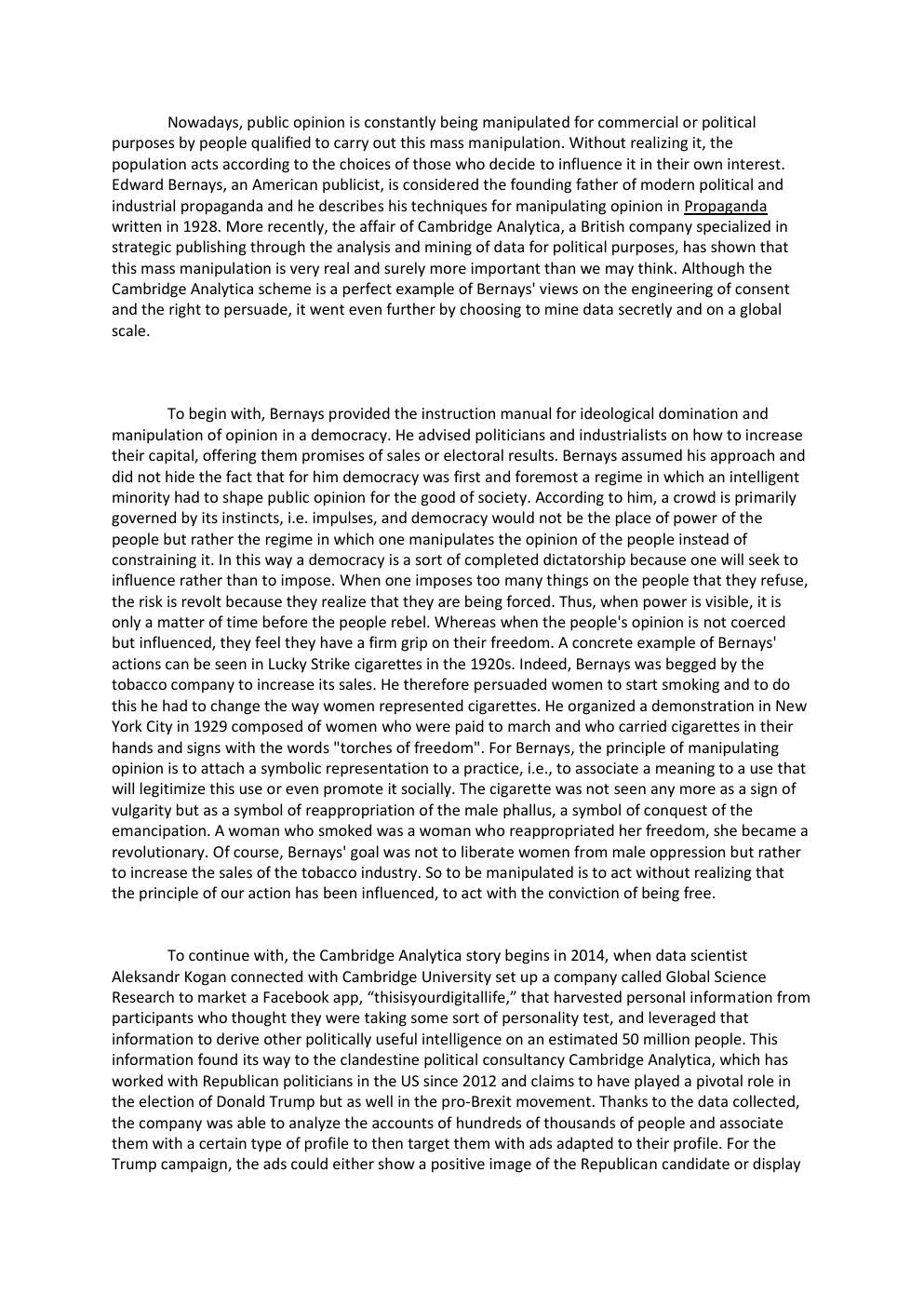Essai en anglais sur la propagande de masse (Edward Bernays, Cambridge Analytica)
Publié le 19/06/2023
Extrait du document
«
Nowadays, public opinion is constantly being manipulated for commercial or political
purposes by people qualified to carry out this mass manipulation.
Without realizing it, the
population acts according to the choices of those who decide to influence it in their own interest.
Edward Bernays, an American publicist, is considered the founding father of modern political and
industrial propaganda and he describes his techniques for manipulating opinion in Propaganda
written in 1928.
More recently, the affair of Cambridge Analytica, a British company specialized in
strategic publishing through the analysis and mining of data for political purposes, has shown that
this mass manipulation is very real and surely more important than we may think.
Although the
Cambridge Analytica scheme is a perfect example of Bernays' views on the engineering of consent
and the right to persuade, it went even further by choosing to mine data secretly and on a global
scale.
To begin with, Bernays provided the instruction manual for ideological domination and
manipulation of opinion in a democracy.
He advised politicians and industrialists on how to increase
their capital, offering them promises of sales or electoral results.
Bernays assumed his approach and
did not hide the fact that for him democracy was first and foremost a regime in which an intelligent
minority had to shape public opinion for the good of society.
According to him, a crowd is primarily
governed by its instincts, i.e.
impulses, and democracy would not be the place of power of the
people but rather the regime in which one manipulates the opinion of the people instead of
constraining it.
In this way a democracy is a sort of completed dictatorship because one will seek to
influence rather than to impose.
When one imposes too many things on the people that they refuse,
the risk is revolt because they realize that they are being forced.
Thus, when power is visible, it is
only a matter of time before the people rebel.
Whereas when the people's opinion is not coerced
but influenced, they feel they have a firm grip on their freedom.
A concrete example of Bernays'
actions can be seen in Lucky Strike cigarettes in the 1920s.
Indeed, Bernays was begged by the
tobacco company to increase its sales.
He therefore persuaded women to start smoking and to do
this he had to change the way women represented cigarettes.
He organized a demonstration in New
York City in 1929 composed of women who were paid to march and who carried cigarettes in their
hands and signs with the words "torches of freedom".
For Bernays, the principle of manipulating
opinion is to attach a symbolic representation to a practice, i.e., to associate a meaning to a use that
will legitimize this use or even promote it socially.
The cigarette was not seen any more as a sign of
vulgarity but as a symbol of reappropriation of the male phallus, a symbol of conquest of the
emancipation.
A woman who smoked was a woman who reappropriated her freedom, she became a
revolutionary.
Of course, Bernays' goal was not to liberate women from male oppression but rather
to increase the sales of the tobacco industry.
So to be manipulated is to act without realizing that
the principle of our action has been influenced, to act with the conviction of being free.
To continue with, the Cambridge Analytica story begins in 2014, when data scientist
Aleksandr Kogan connected with Cambridge University set up a company called Global Science
Research to market a Facebook app, “thisisyourdigitallife,” that harvested personal information from
participants who thought they were....
»
↓↓↓ APERÇU DU DOCUMENT ↓↓↓
Liens utiles
- Thomas Edward Lawrence, dit Lawrence d'Arabie1888-1935Orientaliste, agent politique anglais et littérateur.
- E.E. Cummings par Lloyd Frankenberg Edward Estlin Cummings est né à Cambridge,
- Bernard Williamsné en 1929Philosophe anglais ayant enseigné à Cambridge et Oxford, il se distingue par son refus del'objectivisme en morale.
- Manning, Henry EdwardManning, Henry Edward (1808-1892), ecclésiastique anglais, comptant parmi les principales figures du mouvement d'Oxford.
- e.e. cummings Né à Cambridge (Massachusetts), Edward Estlin Cummings fit ses


